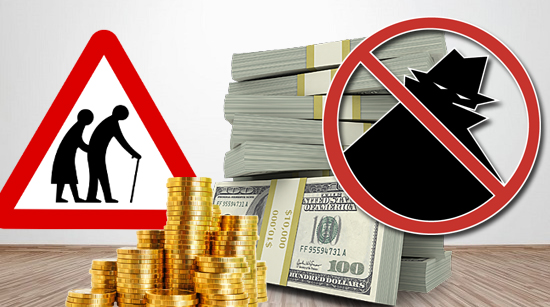AARP has been great about tracking the latest scams tracking senior citizens, but a surprising number of people continue to fall for scams, mostly pitched over the phone. First, I have a practice of using caller ID and won’t pick up the phone if I don’t recognize the caller. This can screen out a lot of the potential scammers. AARP says that historically fraud operators have tried to get your money in one of four ways—gift cards, wire transfers, cyber currency or cash. These are all untraceable once you send them. However, AARP says a fifth form of payment is on the rise, peer-to-peer (P2P) money transfer services like CashApp, Venmo or Zelle. Beware of anyone asking you to send money using these apps.
Pebble Beach, CA Elder Abuse Alert
The Federal Trade Commission, or FTC, tracks a wide array of scams which target seniors in affluent areas of the country including Carmel, Pacific Grove and Pebble Beach. A typical approach is to call you and say they are from a government agency and say that you owe taxes or a fine. They will typically ask you for a gift card, which is untraceable. Don’t fall for this, a government agency would never ask for a gift card. In my opinion, the best way to avoid most of these fraudulent schemes is to use caller ID and if you do not recognize the number don’t pick up the phone. Scammers are getting more sophisticated so even if it is from an 831 area code this number may have been “spoofed” and the caller can be from anywhere. For more information, visit the website www.ftc.gov/giftcards
Pebble Beach, CA Elder Abuse Alert, Beware Of Fraudsters Asking You To Use CashApp, Venmo Or Zelle
AARP has been great about tracking the latest scams tracking senior citizens, but a surprising number of people continue to fall for scams, mostly pitched over the phone. First, I have a practice of using caller ID and won’t pick up the phone if I don’t recognize the caller. This can screen out a lot of the potential scammers. AARP says that historically fraud operators have tried to get your money in one of four ways—gift cards, wire transfers, cyber currency or cash. These are all untraceable once you send them. However, AARP says a fifth form of payment is on the rise, peer-to-peer (P2P) money transfer services like CashApp, Venmo or Zelle. Beware of anyone asking you to send money using these apps.
AARP Fraud Alerts Just Keep Coming
AARP has been great at tracking down fraudsters, alerting the public and passing on information to the authorities to make sure that they get permanently shut down. Six people have pleaded guilty and two are charged but not yet arrested for taking part in a grandparent fraud operation that stole from more than 70 older Americans. A federal judge called the ringleader Timothy Ingram “heartbreakingly evil.” He was sentenced to nine years in prison for stealing almost $2 million from grandparents, including 10 people who lost more than $300K. The gang would call the grandparent and pretend to be their grandson or granddaughter and say they were in jail and needed money wired to get them out. U.S. District Judge Cathy Ann Bencivengo said during the sentencing hearing that she hoped tough sentences would warn others against participating in what she said was one of the most harmful she had seen in her 17 years on the bench.
AARP Keeping On Top Of Elder Abuse Financial Scams
AARP has been great at tracking down fraudsters, alerting the public and passing on information to the authorities to make sure that they get permanently shut down. Six people have pleaded guilty and two are charged but not yet arrested for taking part in a grandparent fraud operation that stole from more than 70 older Americans. A federal judge called the ringleader Timothy Ingram “heartbreakingly evil.” He was sentenced to nine years in prison for stealing almost $2 million from grandparents, including 10 people who lost more than $300K. The gang would call the grandparent and pretend to be their grandson or granddaughter and say they were in jail and needed money wired to get them out. U.S. District Judge Cathy Ann Bencivengo said during the sentencing hearing that she hoped tough sentences would warn others against participating in what she said was one of the most harmful she had seen in her 17 years on the bench.
Medicare Fraud Rose Dramatically During COVID
A new internal report revealed that new channels of Medicare fraud opened up during the COVID pandemic. This was due in large part to meet newly emerging health care needs of older Americans which left the program vulnerable to falsified billings. In just one example, the Office of Inspector General (OIG) at the U.S. Department of Health and Human Services released a study in September that said it had already detected potentially fraudulent billings related to telehealth from more than 1,700 health care providers. This translated to a loss to the government of $128 million. In California, a federal jury convicted Mark Schena, the president of a Silicon Valley medical technology company, of a conspiracy to bilk Medicare and private insurers out of $77 million. They marketed a COVID test not approved by the Food and Drug Administration (FDA) and paired it with other expensive tests. Also in our state, health-testing laboratory owners Imran Shams and Lourdes Navarro face charges of defrauding Medicare out of $214 million. They used COVID testing as a pretext to add on expensive and unnecessary respiratory pathogen tests while paying illegal bribes to medical marketers for directing doctor’s orders to their labs.
Medicare And MediCal Fraud Likely Involved In Some TeleHealth claims
The federal government has generally been in favor of TeleHealth since the beginning of the COVID-19 pandemic. However, a recent report from the Department of Health and Human Services Office of Inspector General found less than 1% of the 742K Medicare-certified doctors billed Medicare nearly $28 million in TeleHealth claims that resulted in a half million claims that are “problematic.” This is sure to cause further investigation.
Monterey, CA Elder Abuse Victims Send Their Tormentor To Prison
John Lloyd Osborne IV, himself almost a senior at 64 years of age, was sentenced to nine years in prison after pleading guilty to four counts of theft from an elderly person, one count of theft from a dependent adult, one count of forgery, one count of identity theft, one count of using fraud in the offer or sale of a security and one count of conspiracy to destroy evidence. Back in 2006, Osborne solicited $250K from one elder victim to invest in a shell company that never did anything. In 2010 and 2011, he used false pretenses to solicit $100K from one victim and $5,000 from another. In 2015, he obtained power of attorney over a dependent adult who was unable to care for himself. He refinanced the victim’s house and paid himself $250K. Then in 2018, he sold the worthless company to someone else for $200K. How brazen! You would be amazed at how easily some seniors are scammed out of their life savings.
Elder Abuse Scam : The Trick Payment Method
The AARP Fraud Watch Network has been taking complaints from consumers who are buying sought after items online. They are told that the merchant does not take credit cards and that the only way they can pay for the item is through the app Zelle. The problem is that, unlike credit card transactions which can be disputed, once you send money via Zelle or some other peer-to-peer payment app, the money is gone for good.
Elder Abuse Rose During COVID-19 Pandemic
We have all struggled with various issues during the pandemic. However, seniors have more to watch out for than the average American—they have been inundated with coronavirus based scams. The Wall Street Journal recently wrote a story about a caregiver who was on probation for a felony robbery conviction who was hired by a long-term-care facility which didn’t do a background check (note that all of our caregivers undergo an extensive background check, including a Department of Justice criminal record check). She stole an engagement ring and credit cards from an 86-year-old woman dying from COVID-19. Just a few hours after the woman died, the caregiver swiped the stolen credit card to get a burger and fries at Wendy’s. In another case, a woman in her 80’s found that her house had been stolen—her name had been forged on the deed to her house and it was sold in a virtual transaction. The list of crimes goes on and on. One lesson to be learned is don’t ever allow someone that you don’t know into your home unless they have a license from the state. You can check on this by using the link below.
https://www.cdss.ca.gov/inforesources/community-care/home-care-services









